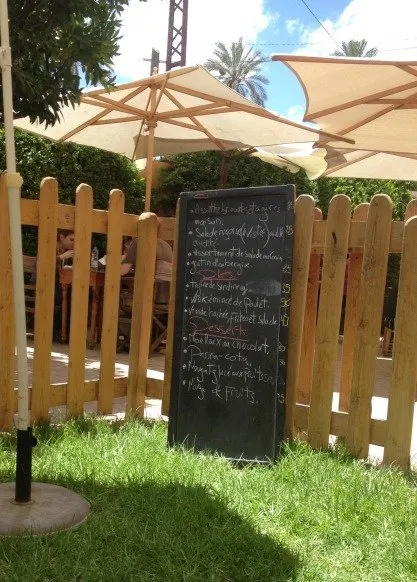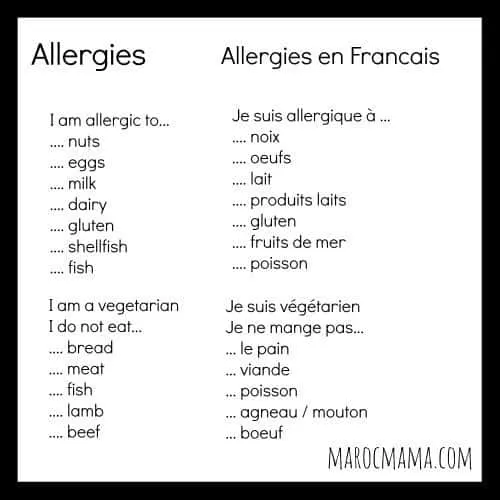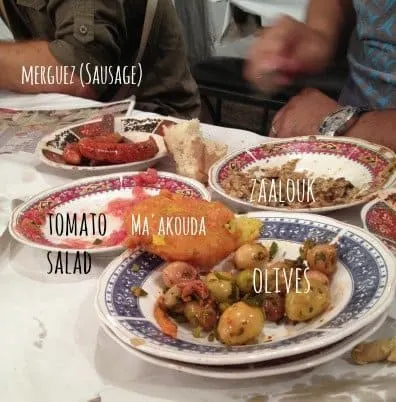One of the most frequent questions I get in my inbox relates to food allergies and visiting Morocco. This is something we were very worried about before our move. Our youngest son has an allergy to cucumbers and MarocBaba was diagnosed with celiac disease a few years ago. If you’re going to travel to Marrakech or moving to Morocco in general, it’s important to know what you’ll be up against.
Education

In large cities, tourism is a major industry. People are aware of the needs of travelers and varied diets. While 10 years ago someone who said they were a vegetarian would be met with glazed over eyes, today this is very normal and many menus point out options that are vegetarian friendly.
I’ve seen several menus that are now listing gluten free options but I’ll be realistic when I tell you the large majority of people do not understand gluten allergies. Bread is an integral part of the Moroccan diet and many can not fathom not eating it. Don’t ever feel pressured to eat it!
Some words that you might want to know;
- hassasiya…. — this means “allergy or allergic to”
- luz — nuts
- d’geg — flour (I use this word for gluten)
- hleb — milk/dairy
Flexibility
If you’re used to eating, or not eating certain things you may want to prepare yourself ahead of time. Even some things that are very easy to purchase in the US or Europe are not as easy to find in Morocco.
Again, you’ll have more luck in big cities. If you’re used to for example, using coconut oil or drinking coconut milk instead of regular milk be prepared to not find these items in Morocco. You’ll need to work with what you can find, unless there’s something you absolutely can not substitute. In that case, you should bring it with you, if possible.
If you find yourself eating in someone’s home, you can let them know ahead of time if you have allergies, they will appreciate it and it will make everything more comfortable for everyone.
For example if you don’t eat bread you can ask for a fork to eat tajine with, or ask for the couscous to be served separately from the meat and vegetables.
Understanding
For many people in Morocco having food allergies are a luxury not a way of life. Even if people don’t have an allergy they can’t really understand the idea that one would choose not to eat meat, or only eat vegetables. Because life here for many is one of survival they eat what is available.
While some do know what gluten-free is, don’t expect people to know what a paleo diet is, for example the phrase “I only eat paleo” or “I only eat keto” will mean absolutely nothing to 99% of people you meet.
Be clear about the things you can eat or specifically state the things you can not eat. If you have several allergies consider printing a list that has the name of the item and the translation into French. Better yet – you can print this picture right here, where I’ve translated common allergies for you!
If you’re gluten free I also highly recommend purchasing this gluten free translation card that you can carry with you!
Options
If you’re ready to find some great food that will fit int your diet here are some options that you can order. You should check with the restaurant before ordering as they may have slightly different ways of cooking things.
Vegetarian
This is the easiest. Many things are already made without meat and won’t require much extra effort. Some menu items;
- salads
- vegetarian couscous
- fish tajine with vegetables (if you eat fish)
- vegetable tajine
- maakouda
- bean or lentil dishes (unlike in Europe or US they aren’t made with a meat base flavor)
- eggs
Gluten Free/Dairy Free
Many Moroccan foods are gluten free to begin with and dairy is rarely used in Moroccan cooking. It’s the addition of bread as an eating tool that makes things difficult. Avoid all breads as there are no breads made only with gluten free flour unless you’re buying at a specialty shop. Some foods that you can enjoy;
- raib – a Moroccan yogurt that’s great for breakfast (this is not dairy free)
- Couscous can be enjoyed, simply ask for rice instead of semolina couscous – many places can accommodate
- All tajines are typically gluten-free
- Moroccan salads are also gluten free naturally
- Many markets like Carrefour or Marjane carry yogurts that are made with soymilk instead of cow milk) as well as non-dairy milks.
Watch out for soups like harira that are often thickened using flour.
Nut Allergies
Nuts are a Moroccan favorite but are used sparingly as they are expensive. You will want to avoid nearly all Moroccan cookies as they are found in many, many pastries. Sometimes tajines like the famous beef and prune tajine are decorated with fried almonds. Just alert anyone that you have a nut allergy and they will avoid them.
Of all food allergies nut allergies are likely to be the most well known.
Marrakech Restaurants for Safe Eating
As mentioned, many places can make alterations or let you know what is safe for you to eat or not based on your allergy. You may want to double and even triple check. If you are staying in a riad, the majority are aware and able to help by creating meals that fit your needs.
They also offer some of the best meals in the city! These restaurants are some that I know and trust to understand what food allergies are and the proper way to handle foods for those with allergies. You’ll notice these are all mid to low-priced restaurants. The majority of upmarket restaurants will be able to meet any allergy needs you have.
Amal Moroccan Restaurant and Women’s Training Center Angle rues Allal ben Ahmad et Ibn Sina, Gueliz, Marrakesh
Amal is only open for lunch but the staff is always willing to help you find things that are safe to eat on the menu and make adjustments as needed. All of the food is made onsite, fresh daily and as ordered. Staff speak Arabic, English, French, and Spanish.
Cafe Clock Derb Chtouka, Kasbah, Marrakesh
This cross cultural cafe is in an area of Marrakech that’s often less frequently visited. The residential quarter of the Kasbah is the heart of old Marrakech. You can trust their food offerings 100%. Vegan items are clearly notated on the menu. There are also gluten-free options. Simply let the all English speaking staff know what allergies you have and they can help!
The Henna Cafe Arset Aouzal Rd, Souikat, Marrakesh
This restaurant offers a mix of traditional and fusion Moroccan cuisine with a hint to Levant favorites like hummus and falafel. They offer many vegetarian options and can adjust your meal for nut allergies. If you’re wanting to receive a henna application while you’re in Morocco this is the place to go for beautiful designs, safe henna, and a fair price without the hassle.
The Earth Cafe Derb Zawak, Riad Zitoun Kedim 2, Medina, Marrakesh
This is one of the only exclusively vegetarian/vegan restaurants in Marrakech. It gets mixed reviews, while some are thrilled to find a menu full of choices while others say the flavors and menu items aren’t up to par.
La Creperie du Marrakech 14 Petit Marche de Gueliz | Route de Targa, Marrakesh
This small cafe serves Brittany style crepes that are really great. The savory crepes are gluten-free. They are made with a special buckwheat that the owners bring from France. Order either sweet or savory with the buckwheat flour! This place is a favorite for us!
Le Pain Quotidien Marrakech Unité 5 Boulevard Allal Al Fassi, Daoudiate, Marrakesh
In a darija class I was talking I discovered the husband of one of my classmates owns/manages this bakery and they had a line of gluten free products. If you have a severe allergy to gluten this will not work for you. But if you have an intolerance you can find some great cakes, breads, and cookies offered. They also have sugar free baked goods as well for those that need or want a low sugar diet.
Related Posts
Gluten Free Guide to Marrakech
Vegetarian Guide to Marrakech
Disclaimer: These are suggestions only. Please be sure to double check with any establishments as their menus may have changed from the time I visited and published this.


Janet
Thursday 30th of November 2023
Hi Amanda I am travelling to Morocco in January and I have an allergy to all fish and seafood. If I order vegetarian can I be sure there will not be any fish oil used? Thank you for doing this
Amanda Mouttaki
Friday 1st of December 2023
There's not a lot of fish oil that is used in general but you might have cross contamination issues. If you have a severe allergy I would stick to higher end restaurants where you can clearly explain (if there is fish/seafood on the menu) or go with restaurants that don't have it on their menus at all. Something like a tajine, that is cooked in it's own vessel won't have those kinds of risks.
Kris
Monday 26th of June 2023
Hi Amanda,
This is an incredible post. My preschooler is severely allergic to eggs, sesame, coconut, goat milk, and sheep milk. Are any of these ingredients widely used in Morocco? I've always wanted to visit Morocco but have been worried about how to navigate the food scene with my little one, so thank you for this post. I saw the comment about sesame below and was curious to know if tahini (sesame paste) is a common staple in Moroccan cuisine? Also, are there specific cities that take food allergies more seriously? Thanks a lot!
Kris
Tuesday 27th of June 2023
@Amanda Mouttaki, Hi Amanda, Thank you so so much for your reply. Very grateful for your help.
Amanda Mouttaki
Monday 26th of June 2023
Hi Kris - there is no tahini in Morocco it's actually very hard to find in general and not a part of the diet. Eggs and coconut will likely be the most common thing you run into though again not so common (the exception being in desserts/cookies). I think if you stick to larger cities you'll be able to avoid most of these things without issue.
KarenT
Sunday 17th of July 2022
Hi there,
Thank you for your posts and site its super helpful.
My daughter is going to Morocco with school and has a nut allergy and is vegetarian. Just wondered if Brazil nuts used in Morocco much (its the one she's most allergic to)?
Also please can you tell me how to say, I am a vegetarian and I don't eat meat or fish. I also have a nut allergy, please don't give me any nuts or nut oil or it could harm me?
If this would make sense?
Thank you so much. Karen
Amanda Mouttaki
Thursday 1st of September 2022
Hi Karen - Brazil nuts are not used in Morocco - I've never seen them. People understand the word vegetarian. I would suggest looking for specific menu items that do not contain meat, chicken or fish to order from. Also nut oils are rarely used - vegetable oil or olive oil are the most widely used.
Kara S
Friday 3rd of January 2020
Hello, What oil is commonly used to cook with? Is peanut oil used?
Thank you, Kara
Amanda Mouttaki
Saturday 4th of January 2020
Typically it's vegetable oil - have never seen peanut oil used or sold here.
Marisa
Thursday 2nd of January 2020
Thanks for the informative post! How difficult is it to avoid sesame? My son has a sever sesame allergy. Thanks!
Amanda Mouttaki
Saturday 4th of January 2020
It's not widely used -it sometimes used as a garnish or on cookies but otherwise not much - not like in Middle Eastern countries.